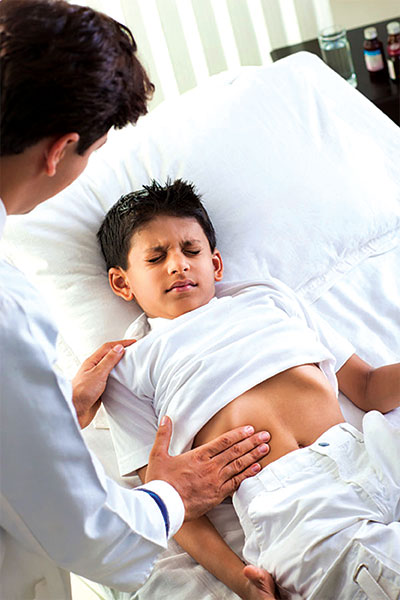If your child is constantly complaining of stomach ache, loss of appetite and fatigue, it’s time for a round of deworming
 Though people of all ages can be infected with stomach or intestinal worms, children are more susceptible to this particular infection which negatively affects their mental and physical development. Children with worms are often underweight and tend to be stunted. Heavy infections often make children too sick or tired to concentrate at or even attend school. Treatment involves deworming i.e, the process of removing infestation of worms in the intestine with the help of prescription drugs.
Though people of all ages can be infected with stomach or intestinal worms, children are more susceptible to this particular infection which negatively affects their mental and physical development. Children with worms are often underweight and tend to be stunted. Heavy infections often make children too sick or tired to concentrate at or even attend school. Treatment involves deworming i.e, the process of removing infestation of worms in the intestine with the help of prescription drugs.
According to the World Health Organisation (WHO), soil-transmitted helminth (STH) infections are among the most common contagions in humans. Worldwide, an estimated 1.5 billion people are infected with STH, caused by parasites such as roundworms, whipworms, and hookworms commonly found in contaminated soil. WHO estimates that in India, 64 percent of children below 14 years are at risk of STH infections.
Therefore, it is imperative that children are dewormed regularly because if left untreated, worms can multiply and lay eggs in the intestines, leading to severe health complications, which can be fatal. Children suffering this infection are more prone to diseases such as intestinal obstruction, anaemia, and diarrhoea. Moreover, STH reduces the body’s ability to absorb vitamins, iron and proteins and results in loss of appetite, reducing nutritional intake and physical fitness.
Causes
Children between 4-11 years of age are highly susceptible to STH. Intestinal worms are usually found in children exposed to unclean surroundings and who are in direct contact with soil contaminated with faeces of affected humans or animals.
Unwashed hands, toys and food are common media for transmission of these parasites, which travel easily from contaminated soil to the mouths of children and eventually lodge inside the body. Sometimes undercooked food, meat, fruits and vegetables are infected with worms.
 Symptoms
Symptoms
Sore tummy
Loss of appetite
Weight loss
Bouts of hunger
Vomiting and nausea
Anaemia
Diarrhoea
Rashes, itching in the anal region
Rare occurrence of blood during diarrhoea or in stool
Sleep deprivation due to itchiness
Frequent and painful urination
Constant cough
Fatigue and lethargy
If your child shows any of these symptoms, instead of administering over-the-counter tablets, consult your general physician or paediatrician.
Deworming
Deworming eliminates worms and improves childrens’ health by helping the body absorb nutrients. The commonly administered deworming tablet is Albendazole, given twice a year to children. Following consumption, children expel worms via natural excretion.
WHO (World Health Organisation) recommends regular deworming of school children. Several studies have shown that deworming has a significant impact on the health, education and livelihoods of children. Benefits of deworming children include:
Decreases anaemia and improves nutrition
Stimulates growth and weight gain
Improves cognition and mental and physical development
Prevents other infections
Supports school attendance
Improves children’s ability to learn better and become more active in school
Increase in hours worked and wages earned in adulthood
Prevention
STH infections can be prevented by taking simple precautions:
Ensure play areas and surroundings are clean
Encourage children to wash their hands and feet every time they come indoors after play and using toilets
Instruct children not to play barefoot in muddy outdoor areas.
Ensure children use hygienic swimming pools.
Wash vegetables and fruits thoroughly. Avoid fruits or vegetables which look infested.
Avoid raw meats or semi-cooked vegetables
Drink boiled water.
(Dr. K.N. Harsha is a consultant paediatrician at the Aster RV Hospital, Bangalore)


























